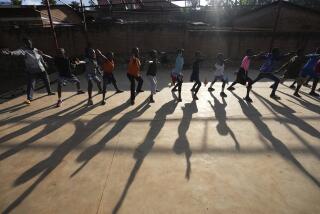U.N. finds mass grave in South Sudan as fighting spreads
JOHANNESBURG, South Africa -- The United Nations said Tuesday that its staffers have found a mass grave in South Sudan, one of at least three reported as fighting, often based on ethnicity, has spread rapidly to half the country’s 10 states.
“Mass extrajudicial killings, the targeting of individuals on the basis of their ethnicity and arbitrary detentions have been documented in recent days,” U.N. High Commissioner for Human Rights Navi Pillay said in a statement.
The U.N. Security Council was set to vote Tuesday on a proposal to increase its peacekeeping force in South Sudan by 5,000, adding to just over 7,000 uniformed personnel.
U.N. staff on Monday counted 14 bodies in a grave in Bentiu, in Unity State, and 20 others at a nearby river, the Associated Press reported. The victims were reportedly members of the Sudan People’s Liberation Army and were believed to be among 75 ethnic Dinka reported as missing and feared dead, a spokeswoman for the Geneva-based human rights office told the AP.
There were reports of at least two other mass graves near the capital, Juba, Pillay said in the statement. Many of those killed in that area are of the Nuer ethnicity, according to local accounts of the violence.
The U.S. ambassador to the United Nations, Samantha Power, said Washington supports an increase in the U.N. deployment, along with other members of the Security Council. The proposal involves redeploying troops from other African missions, such as Liberia, Ivory Coast and the Democratic Republic of Congo.
“The future of South Sudan is in jeopardy, and this moment demands urgent leadership to avoid further bloodshed and to restore stability,” Power said in a statement late Monday.
According to a U.N. statement Tuesday, 81,000 people have fled their homes in South Sudan in the last week, 45,000 of whom have sought shelter in or near U.N. bases. Thousands of others are hiding in the bush, for fear of being killed because of their ethnicity, according to local reports, and production has shut down in several major oil fields.
“There are credible reports of grave abuses committed against civilians in different parts of the country, including killings,” the U.N. said. “Some of these abuses have reportedly been tied to the ethnic identity of the victims.”
Toby Lanzer, the U.N. humanitarian coordinator in South Sudan, tweeted Tuesday that he was hearing accounts of human rights abuses.
“More accounts reaching me about a breakdown in respect for the most basic rights of people,” he said.
There are no up-to-date estimates of the number of dead, with many victims trapped in remote areas, but regional analysts are warning that thousands may have been killed.
Intense diplomatic efforts are underway to bring President Salva Kiir and the man he sacked in July as vice president, Riek Machar, to the negotiating table. Kiir has accused Machar of launching a coup attempt, a claim that Machar denies. Machar says Kiir must stand down as president.
Though the violence stemmed from a power struggle between the longtime rivals, it quickly took on an ethnic dimension. Kiir is a Dinka and Machar a Nuer.
Both sides claim to be ready for peace talks. The main stumbling block is that Kiir is demanding that Machar come to the negotiating table with no preconditions, while Machar is insisting on the release of 10 opposition politicians before he will talk.
There was intense fighting Tuesday for control of the city of Malakal in the oil-producing state of Upper Nile, local radio reported. Unity state, another oil-rich area, and Jonglei are in the hands of rebels loyal to Machar.
If Juba loses control of a second major oil state, it would be a huge blow, because the government relies on petroleum for 98% of its revenue. Oil Minister Stephen Dhieu Dau told Reuters news agency Tuesday that production in Unity state had been shut down.
The oil shutdown also affects South Sudan’s northern neighbor, Sudan, which benefits from transit fees. South Sudan won independence from Sudan in 2011 after a peaceful referendum.
The government of South Sudan said on its Twitter feed Tuesday that its forces were advancing on Bor, the capital of Jonglei state, with an attack to retake Bentiu also planned soon.
U.S. envoy Donald Booth pressed Kiir for a ceasefire and peace talks in a meeting Monday, as did regional leaders from the Intergovernmental Authority on Development.
But both sides seemed intent on continuing the fight before holding peace talks, to maximize their negotiating strength.
“I am in the bush, and I am trying my best to have a better negotiating position,” Machar was quoted as saying by Reuters.
U.N. Secretary-General Ban Ki-moon has warned that those responsible for atrocities would be held accountable.
Twitter: @latimesdixon
More to Read
Start your day right
Sign up for Essential California for news, features and recommendations from the L.A. Times and beyond in your inbox six days a week.
You may occasionally receive promotional content from the Los Angeles Times.






